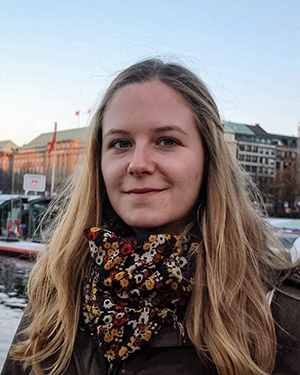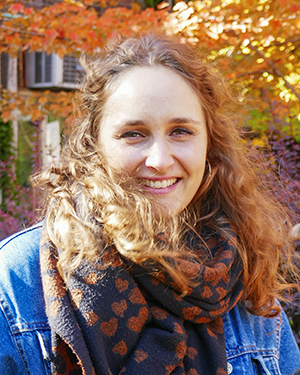When Studying Abroad Gets Complicated
Freiburg, May 07, 2020
The international community is fighting a common problem. The Covid-19 pandemic has spread all over the world and is changing the lives of many people. Students are also spending their studies abroad differently than they had originally planned – also those who are from or are visiting the University of Freiburg. Patrick Siegert talked to five students about their impressions of the changes at their host universities and how these have affected their daily lives.
 Photo: nito/stock.adobe.com
Photo: nito/stock.adobe.com
 Matevž Štular is a student of medicine from the University of Ljubljana in Slovenia and is currently enrolled at the University of Freiburg
Matevž Štular is a student of medicine from the University of Ljubljana in Slovenia and is currently enrolled at the University of Freiburg
“In the winter semester 2019/20, I studied medicine at the University of Freiburg, with a focus on internal medicine and pediatrics. During the semester break, I returned to Slovenia to take a few courses there. I had originally planned to return to Freiburg for the summer semester, but then the Covid-19 pandemic broke out. I’m currently living with my parents in Slovenia and working at a coronavirus hotline call center with other medical students. We answer people’s questions in these difficult times. I stay in touch with my friends online, including my friends from Freiburg. Otherwise, I developed a new routine to have some variety from one day to the next. I’m taking some online classes this summer semester at the University of Freiburg. I don’t know when I’ll be able to come back to Germany yet, but I’m confident that I’ll be able to spend the summer semester in Freiburg.”
Photo: Nejc Čampelj
 Milena Luongo is currently studying archeology and art history at Voronezh State University in Russia
Milena Luongo is currently studying archeology and art history at Voronezh State University in Russia
“The University campus has been closed since the middle of March, so we have only online classes. My Russian class hasn’t gone down in quality at all and still requires a lot of work. We have an hour and a half of teaching on Skype every day. For the other classes, we get weekly written assignments. My student life hasn’t changed much. However, I’m now the only one of my friends living off campus and not in the dorms, which only residents can access now. Before the crisis, we used to get together there regularly on weekends to eat dinner together. We also used to go out at night and do other things as a group. My fellow students can spend time with each other, but I’m isolated for the most part. We only communicate virtually. So far, there’s no easing of the lockdown measures in sight, so I can’t go home. Unfortunately, I also can’t travel around the country, go to museums or the theater, or get to know people from Russia. Still, I’m aware how privileged I am. It would be really inappropriate to complain about my ‘ruined’ semester abroad, while other people have to struggle with existential issues and health problems.”
Photo: Gracia Fässler
 David Pister is currently studying German and sports at the University of Stavanger in Norway
David Pister is currently studying German and sports at the University of Stavanger in Norway
“I started the Outdoor Education course at the University of Stavanger in January 2020. I’m learning to how to be an expert nature guide for school students. We focus on cross country skiing, but we also do kayaking, surfing, and rock climbing. I live with eight other people in a shared student apartment in the dorms. The Norwegian government closed schools, universities, and kindergartens already in the middle of March. I got the news on my way back from an excursion to Sirdal, Norway. From then on, the program changed dramatically. Excursions, first aid training, and climbing lessons were replaced by homework assignments that we can do on our own. The head of our program tries to give us assignments that can be done outdoors. We have to identify species of birds and plants, make bows, or carve flutes out of wood. We have to document everything on camera and make short films out of the material. I’m enjoying my time here as much as possible by trying to keep my day structured and spending the rest of my time hiking, reading, cooking, and even fasting. After all, right now I have time to try out new things.”
Photo: David Pister
 Mathias Vavro is currently studying international business relations at the Université Paris-Est Créteil in France
Mathias Vavro is currently studying international business relations at the Université Paris-Est Créteil in France
“The shutdown has been pretty strict in France. We’re only allowed to leave home to do errands, and we can only be outside for an hour at most within one kilometer of where we live. The last three weeks of lectures at the University were supposed to be online, but only a few classes actually took place. Many ongoing classes were simply canceled. At first we didn’t get any information from the University, then we learned that some of the exams would be done by video conference, while there would be written papers for other classes. However, we were told we wouldn’t get the topics assigned until May. Because the semester was supposed to be over by the end of April, I’d applied already months ago for an internship that would start in May. Other students and I have contacted the University administration a number of times to alert them to our situation, but we still haven’t received an answer. I understand that it’s difficult to find a suitable solution for everyone in such a short time. Still, many of us don’t know how we’re going to be able to write our papers on top of the internship in May. At least, I’ve been using the free time at home to work on a book I’m writing and to stay in touch with friends. I’m looking forward to when the lockdown is finally loosened in the middle of May. However, I’m not going to have lots of good memories of my year abroad.”
Photo: Johannes Mielitz
 Julia Fischer is currently studying British and North American cultural studies at the University of Edinburgh in Scotland
Julia Fischer is currently studying British and North American cultural studies at the University of Edinburgh in Scotland
“Scotland has been in lockdown since the beginning of March. Some of my classes have been offered online for the past few weeks. Many tests and quizzes are being cancelled, while others are taking place online or have been replaced by written papers. University teachers and employees were on strike from the end of February to the beginning of March, so I was already working from home before the lockdown. When all the other Erasmus students chose to go home, I decided to stay. Thank goodness I have a job where I work online. I also have great roommates, and my landlady has promised that I can stay in my flat indefinitely. I try to stay focused by maintaining a routine: I get up early, go for walks, eat regularly, do sports, and call people. My original plan after exams was to travel around Scotland before going to Berlin for an internship in the summer. Now, I don’t know if the internship is even going to take place, and whether I’ll manage to travel to Germany in a month’s time. If I have to stay here, I’ll keep doing my job, find time for online classes and hobbies, and maybe even do volunteer work. All in all, I’m happy I stayed and that my family and friends are doing well.”
Photo: Julia Fischer
Good Advice
Arrival Days and Welcome Days, organized by the International Office for new international students have been cancelled this summer semester 2020. You can access the Welcome Days presentations here. Students can currently only contact the International Office by email. If you’re planning to study abroad, you can attend events to receive information and advice during the semester. Please check the website of the International Office for the latest information. The call for applications to study abroad will be announced in upcoming months. The application deadline is expected to be in September 2020.
International Office
The University’s EU Office also posts the testimonies of ERASMUS students on their homepage. The office helps students who are interested in traveling abroad to communicate with universities in other countries. It also helps them to find alternatives should their dream destination not be available. Students can call or contact the EU Office online with any questions about how the Covid-19 pandemic could affect their ERASMUS stay abroad. The office also issues FAQs that are constantly being updated for ERASMUS students from other countries and from the University of Freiburg who are studying abroad. However, information events jointly held by the EU Office, the International Office, and the various University departments will not take place for the foreseeable future.
EU Office

